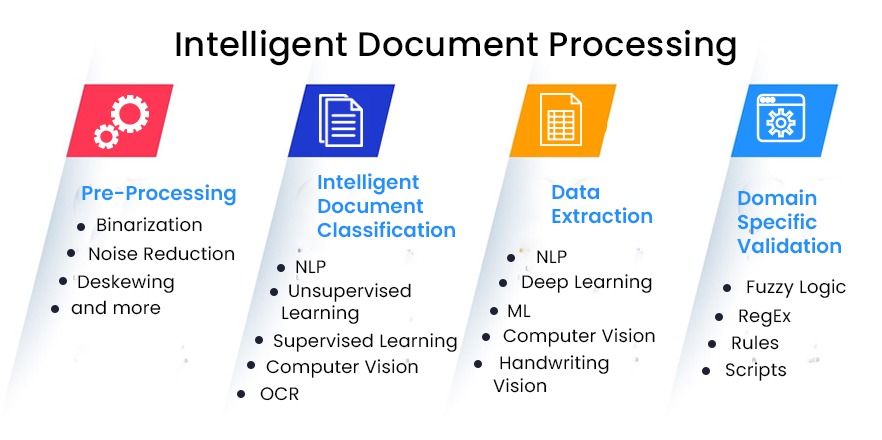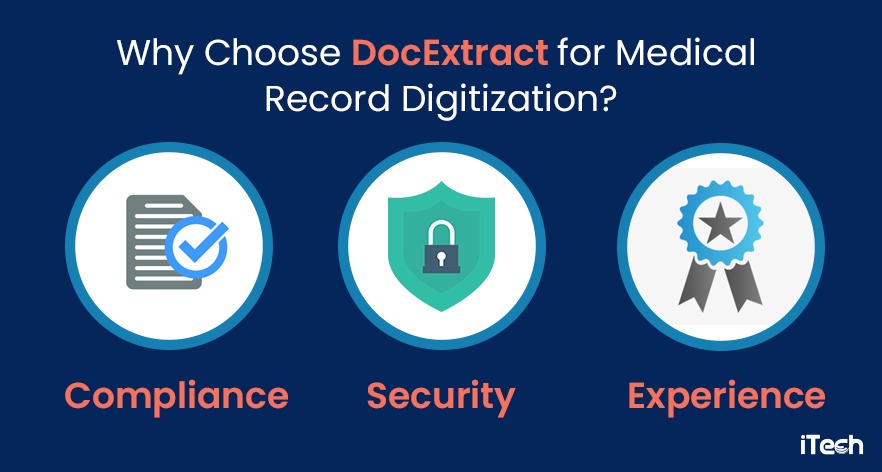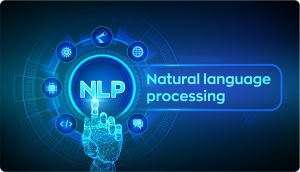
What’s wrong with keeping paper records, after all, we have done it for decades? The answer is that times have not only changed but regulations have too. The Cures Act Final Rule makes it mandatory for all healthcare providers in America to make medical documents available in sharable electronic form. Further, the volume of documents in any medical practice and other commercial healthcare environments is too high to employ a manual method of converting physical documents into a digital form.
As more and more practices and clinics continue to implement EHR systems, they are faced with the hard reality that scanning legacy patient chart information, as well as newly generated medical records, is a bigger challenge than they expected. For bulk conversion of medical documents, there is only one accurate and efficient route, AI-powered document digitization. In healthcare and across industries, we have seen the reallocation of staff and space that previously handled paper-based systems. AI in healthcare brings along with it a significant saving in cost and efficiencies
Computer vision: converting patient records to HIPAA compliant EHR
Computer vision has numerous use cases in the healthcare industry, one of the applications is to digitize physical documents and store them in digital storage systems such as Electronic Health Records. Computer vision or machine vision is the ability of computers to see and comprehend.
The technology uses a document scanner to ‘read physical documents and convert them into binary data. Optical character recognition software looks at the scanned document and marks the light area as background and the dark area as text. How it differentiates what the text is depends on the type of OCR software used.
There are two types of OCR technology depending on its level of sophistication i.e. if AI is incorporated or not.
1. Simple optical character recognition software
The earlier OCR technology that is still deployed by many companies, uses different font and image patterns that are stored as templates. When a document is scanned, the pattern-matching software will compare each character in the text to the internal database of templates. It optically recognizes a word present in its internal dictionary with that in the new document. While OCR technology is fast it is not always accurate. This is because the unlimited font types or handwriting styles can make the process complicated.
Simple OCR software could be a feasible solution when there is only one rule-based format. For instance, it really falters when it comes to handwritten information. The reality though is that a healthcare organization works with a variety of documents. So, OCR since it cannot understand context, might not solve many fundamental issues that exist in a business.
2. Intelligent character recognition software
Intelligent document processing (IDP) reads text in the same way that humans do. It uses advanced methods that integrate machine learning technology and neural networks to train the algorithms to analyze text over many levels. It looks at the images for attributes like curves, lines, intersections and loops and then combines them to validate the text and get the final result.
Let’s be clear though, IDP still uses OCR but it combines it with intelligent technologies so that it can process large variety of documents. Bank checks are a good illustration of the intelligence in intelligent character recognition software. Depending on the bank, each check looks different. Intelligent software is programmed to pull relevant information based on context. For instance, IDP recognizes that $500 is the same as 500 dollars – that is understanding context.
In the health industry some use cases for intelligent document processing are
- Patient reports containing clinical data
- Prescription slips or receipts
- Lab notes from clinical trials
- Clinical trial documentation
- Physician notes

There is a difference in document digitization for the healthcare sector compared to other industries. Companies that provide document digitilization software must have security protocols in place when dealing with sensitive data. HIPAA’s accessibility regulations mandate that companies having access to medical records have to prove that it is safe from human and environmental threats.
Confidentiality and integrity with DocExtract document digitalization services

DocExtract is an iTech proprietary product that uses Natural Language Understanding and OCR to digitize both paper documents as well as PDF, emails etc. We train our ML algorithms to understand your company-specific document models. The product can easily be integrated with EHR systems, like our own RehabONE EHR solution, that provides a secure and cost-effective solution and used by many medical and dental practices in the USA. iTech will handle all the integration points to facilitate delivery of your digitized data to your EMR or EHR system.
We are an HIPAA certified organization and this means we have security protocols in place. We use data and image encryption so that only authorized persons can access information and thus preventing any data breach.
HIPAA also requires that document digitization services and medical facilities should have a data backup and recovery plan in place. The solution we advocate is to use a secure cloud-based document management system. With cloud hosting, your encrypted documents and files stored on off-site servers can only be accessed by unique login credentials and this makes for a reliable and trackable audit trail.
Using a document digitilization facility helps transform your patient medical records into secure electronic files. Always ensure that the document digitization vendor you choose complies with HIPAA best practices and regulations. Talk to us today to know more about our HIPAA compliant digital conversion solutions. Our team of experts can help you solve any of your IT related problems.

Biju Narayanan
Biju is an emphatic people management leader and works by the vision that change is the door to new opportunities and innovation. As Director, he has been guiding iTech on a path of innovation for over 19 years. iTech is a full-service custom software company with a large portfolio of successful domestic and international projects including Fortune 500 organizations. Biju specializes in the healthcare, sports and logistics industries with particular focus on AI and ML. Outside of work, you may find him hitting a lethal jump smash on the badminton court and he is also a creative artist.










